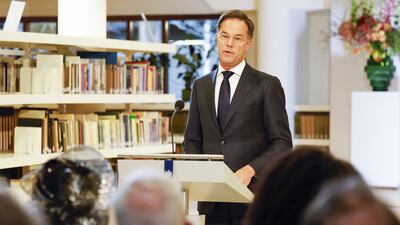Dutch Prime Minister Mark Rutte has formally apologised for his country's historical role in slavery.
Speaking at the Dutch National Archives in The Hague, Mr Rutte said the Netherlands bore responsibility for the "immense suffering" faced by the enslaved and their descendants.
"For centuries, the Dutch state and its representatives facilitated, stimulated, preserved and profited from slavery,” he said. “For that I offer the apologies of the Dutch government.”
The Netherlands first became involved in the transatlantic slave trade in the 16th century, and enslaved hundreds of thousands in Suriname and other Caribbean nations, such as Curacao and Aruba.
Experts estimate it took more than half a million enslaved Africans to the Americas, mostly Brazil and the Caribbean.
Mr Rutte's apology was expected as the Netherlands reckons with its colonial past. A national advisory panel was set up after the 2020 murder of George Floyd in the US, and recommended a formal apology last year.
The slave trade "indirectly or directly under Dutch authority" constituted crimes against humanity, it said in a report.
The PM previously refused to issue an apology, arguing it would divide society.
Some have argued that it is not enough, and an apology should have come from King Willem-Alexander. Others have criticised the PM for not waiting until next year, when 160 years since abolition will be marked.
Some groups went to court last week in a failed attempt to block the speech, the Associated Press reported.
“We know there is no one good moment for everybody, no right words for everybody, no right place for everybody,” Mr Rutte said.
He said the government would establish a fund for initiatives to help tackle the legacy of slavery in the Netherlands and its former colonies, but would not issue reparations,
The Dutch West India Company eventually became the largest transatlantic slave trader, Dutch colonial expert and professor Karwan Fatah-Black told AP.
While known for its tolerance, racism is still an issue in the Netherlands, which has a large population from the former colonies.
The annual Sinterklaas parade is regularly condemned for its use of blackface.
“It’s a very sensitive topic for many people in the Netherlands, which prides itself in being open and equal,” activist Mitchell Esajas told Bloomberg. “But unfortunately there’s a lot of racism.”
In February, Mr Rutte formally apologised to Indonesia for the Netherlands' role in "shameful acts" during the country's struggle for independence in the 1940s.

